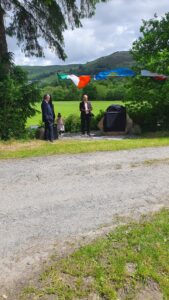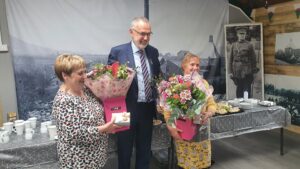A plaque which commemorates the existence of a field called ‘Croke Park’ on the site of the 1916 Easter Rising internment camp in Frongoch in Wales was unveiled by Uachtarán CLG Larry McCarthy and a delegation of GAA officials from Britain and Ulster, and local dignitaries that commemorates the GAA link to the area.






After the Rising of April 1916 there were Irish men sent to internment camps in Britain, and the largest contingent of 1,800 were sent to Frongoch in rural North Wales

While there, the Irish organised athletics meetings and Gaelic football matches and the field used for these activities they christened Croke Park. It was also the setting for the final of the Wolfe Tone Cup in football in July 1916 which saw a Kerry team defeat Louth, a match known as the All-Ireland behind barbed wire.
There was also a Frongoch Leinster Football Championship played with Dublin beating Wexford in August 1916 in the camp.



The fact that the Kerry team in Frongoch included 12 inter-county players and the Louth side had nine inter-county players illustrates the strength of the GAA interest among those in the camp.

To this day, that field in Frongoch remains known locally as Croke Park.




The Kerry team in Frongoch was captained by the legendary Dick Fitzgerald, after whom Fitzgerald Stadium in Killarney is named. Louth were captained by their star player Tom Burke, a man who also was immersed in GAA activity following his return to Ireland and was, among other things,the referee in 1928 when Kildare were the first ever recipients of the Sam Maguire cup as All-Ireland champions.





The specially commissioned stone carries Welsh, Irish and English dedications to the Croke Park field and is part of a wider initiative by the local historical society to preserve the significance of the area which was once a whiskey distillery, then a German POW camp in 1914 before housing the Easter Rising internees between June and December of 1916.


There is now a museum on site which is always welcoming and eager for people to drop in and see the history of the the Irish in Frongoch.


